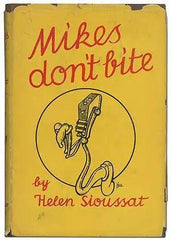What is a Glitch? And why do they happen?
Let’s explore the whole Glitch thing from a different angle – where did it come from and what makes it happen?
It’s not going to surprise you to hear that there are multiple types of glitch, the ones that most people think of are graphic interface glitches, where something goes ‘wrong’ in the display. These are often spectacularly visual, and super annoying for whoever it is that has to work at that screen, but there are several other types of glitch as well.
The human glitch
Not a person as such, more a reflection of our systems and when they…I was going to say, go wrong, but in truth it’s much less binary than that. A glitch isn’t wrong, it’s the result of things not happening in the ways we anticipated. This can be the result of our narrow thinking, or equally our over ambitious plans. These glitches happen all the time, they are part of life and our continued learning. Something that is beautifully captured in this ad.
Capturing a moment in time
Every type of glitch – wherever it comes from, human or computer –is temporary. Glitches are the result of a disruption in communication. Something that Alex Pieschel, writing for Arcade Review, described as "A 'glitch' suggests something more mysterious and unknowable inflicted by surprise inputs or stuff outside the realm of code." Blink and you can miss them, which makes them all the more special, they are temporary at best, which can make capturing them extremely tricky.
Written and spoken words
The word itself is often described as being short for "Gremlins Lurking In The Computer Hardware." But where the term came from, much like the events themselves, is open to question as there are several theories. Here’s a few that we found interesting...

Random House's book of American Slang
This book claims that the term comes from the use of two other terms - the German word glitschen which means 'to slip' and the Yiddish word glitshn 'to slide or to skid'. These descriptions feel pretty accurate for most glitches.

According to a Wall Street Journal article written by Ben Zimmer, it is the Yale law librarian Fred Shapiro who came up with the earliest use of the word (though this is open to debate), in May 1940. The WSJ article references the novelist Katharine Brush who wrote about a glitch in her column "Out of My Mind" where she explains some of the slips, “When the radio talkers make a little mistake in diction they call it a "fluff," and when they make a bad one they call it a "glitch," and I love it”.

Move forward a couple of years and in April 1943, The Washington Post review of Helen Sioussat's book about radio broadcasting, “Mikes Don't Bite”, the reviewer noted an error and wrote, "In the lingo of radio, has Miss Sioussat pulled a 'muff,' 'fluff,' 'bust,' or 'glitch'?"
In 1948 a book called The Advertising and Business Side of Radio, by Ned Midgley explained how a radio station's "traffic department" - the people responsible for scheduling the programmes within a broadcast were the glitch-ers. "Usually most 'glitches,' as on-the-air mistakes are called, can be traced to a mistake on the part of the traffic department".

This is seriously nerdy stuff, in another thrilling publication, Broadcasting magazine, 1953 we find an ad where the RCA boasts that their TV camera has "no more a-c power line 'glitches'."
Bell Telephone ran an equally 'exciting' ad in a 1955 issue of Billboard showing two technicians monitoring the TV signals that were broadcast on Bell System lines: "When he talks of 'glitch' with a fellow technician, he means a low frequency interference which appears as a narrow horizontal bar moving vertically through the picture." This could well be the first reference to something visual, the default that so many of us jump to today when we think glitch, something that I know I am guilty of. Back to the ad, and the text sounds weird today, I cannot imagine what people made of this in 1955, though this was a trade magazine, so they probably had come across the expression before.
1959 and an article in Sponsor, another trade magazine for television and radio advertisers, gave a technical example in a piece about editing TV commercials and splicing tape. "'Glitch' is slang for the 'momentary jiggle' that occurs at the editing point if the sync pulses don't match exactly in the splice."
Bennett Cerf is often citied as the first person to use the term on broadcast TV, during an episode of What’s My Line on the June 20th, 1965, " when anything goes wrong down there (Cape Kennedy), they say there's been a slight glitch." This feels like it is highly probable, broadcast TV and space technology was in its infancy, so there were bound to be glitches.
Keeping with the space theme, the astronaut John Glenn explained his understanding of the term in his section of the book “Into Orbit”, he said “Another term we adopted to describe some of our problems was "glitch." Literally, a glitch is a spike or change in voltage in an electrical circuit which takes place when the circuit suddenly has a new load put on it. You have probably noticed a dimming of lights in your home when you turn a switch or start the dryer or the television set. Normally, these changes in voltage are protected by fuses. A glitch, however, is such a minute change in voltage that no fuse could protect against it".

1965 seems to have been the year glitches really become part of everyday life and dialogue. By July 23rd Time magazine defined the word glitch in print: "Glitches—a spaceman's word for irritating disturbances." This may sound pretty insignificant, but this reference by Time, is now believed to have been the catalyst for the word glitch to enter into common usage during the Space Race. Where, as we’ve already heard, it was used to describe minor faults in the technology that were difficult to pinpoint.
Just like the events themselves, there seems not to be an exact source point for the word being first used, which could perhaps itself be a glitch? Just a thought.
Throughout much of this, there is a strong emphasis on visual ’disturbance’, so it’s easy to see how the term glitch has become synonymous with monitor madness.

How would a tech geek describe a glitch?
So what do the tech geeks say about glitches? How do they rationalise these random events and outputs? Some digging around on Wikipedia reveals this answer. “An electronics glitch is a transition that occurs within a signal before the signal settles to its intended value”.
(Geek voice time) This implies that the ‘glitch’ situation occurs due to race-like conditions that occur between two signals derived from a common source but with different delays.

This race metaphor is interesting (Ok you can stop your Geek voice now). This suggests that the machine looks to send the information to the next point in the quickest way. Unable to determine which is the fastest route, it transmits the signal down multiple channels and if there isn’t a clear winner, if that packet of data arrives at the next point in the chain at the same time as another signal, containing the same information, travelling via a different route, we get a glitch.
After the event
A glitch frequently refers to an error which is not detected at the time it occurs but shows up later in data errors or, much more likely, incorrect human decisions.
There are many situations where people have experienced what we call ‘computer glitches’, the most obvious culprits for these are the incorrectly written pieces of software and code – yes devs, we’re looking at you. But there’s also a strong chance of incorrect instructions being given by the operator/user, something that happens much more than we like to admit, after all to errrrrrr is human!
There’s also the undetected invalid input data, undetected communications errors, computer viruses, Trojan attacks and computer hacking. All of which, come under the general, catch all ‘glitch’ terminology.
Gaming glitches
There are several well know gaming glitches. These include incorrectly displayed graphics – known as collision detection errors, where the game freezes/crashes, sometimes these include sound errors and other features.
"Glitching", if you’re not a gamer, is a term used to explain how players exploit ‘holes’ in the game’s code in order to achieve status or bonuses, such as the ability to run through walls or defying the game's physics. This video is a wonderful parody of gaming glitches.
To make matters more confusing, the glitches can be deliberately induced on some consoles by manipulating the game medium - such as tilting the device, attempting to disconnect one or more connections along the chip connections of the cartridge to interrupt the flow of data between chip and the console, or server and console in the case of streaming (where broadband connections add some interesting affects). Any one of these can create graphic, sound or gameplay glitches.
Part of the quality assurance process (carried out by game testers) involves locating and reproducing glitches. They then compile reports about the glitches to be fed back to the programmers and dev teams, so that they can address the issues.
Some games purposely include effects that look like glitches as a means to break the fourth wall and either scare the player or attempt to unnerve, throwing the player off balance during a new task.

Graphical glitches are more common in platform games, where malformed textures and patterns can directly affect gameplay (invisible features). Here's some great articles from CyberGhost

TV glitches
In all broadcasting, especially streaming, a corrupted signal may glitch in the form of jagged lines on the screen, misplaced squares, static looking sections of the screen, freezing problems, or inverted colours.
These glitches may also affect the audio (dropout) or staggered transmission with some high speed catch ups. Why do they happen? These glitches may be caused by wide a variety of issues including interference from other electronic devices - mobile phones, microwaves, damaged cables at the broadcast source and even the weather.
We can't talk about TV glitches and not include Max Headroom, when you read the synopsis of this series, made in 1987, using a Commodore Amiga (top computer of the time) it's an interesting insight on where we currently find ourselves.
20 minutes into the future, the world has become imbued network-television. It's illegal to turn off your TV, and televisions are given to the needy. In this world, Network 23 has a highly-rated news program with a roving reporter named Edison Carter. But Carter uncovers a plot to cover up lethal "blipverts" and is almost killed. In the process his mind is copied into a computer and the computer-generated personality "Max Headroom" is born. Together, Max and Edison, along with Edison's controller (Theora), their boss (Murray), their boss' boss (Ben Cheviot), and Network 23's boy-genius (Bryce) combat crime, placate sponsors, defeat rival networks, and turn in stories.
Defining the source of glitch
There you go, defining the source of glitch, which is itself an amazing tech phenomenon, who’s history, creation and re-creation remains something of a black hole, unexplained, unexpected and often unwelcome.
With no-one quite sure where or how it started, what created it and how it became part of our language. There's little wonder that there’s a lot of love for a glitch, it’s anti-establishment, anti-system, it’s a rebel that we can’t contain, manage or control. It’s also what inspired the creation of the DressCode business and of course, our glitch shirts.

